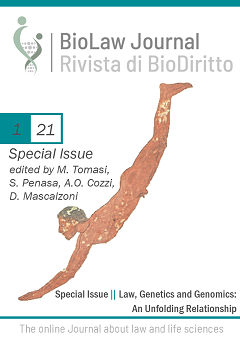Human germline genome editing and human rights law: a "brave new world" is not here to come
DOI:
https://doi.org/10.15168/2284-4503-791Parole chiave:
Human germline genome editing, right to science, eugenics, UNESCO Declaration on the Human Genome and Human Rights, Oviedo ConventionAbstract
Since the dawn of genetic engineering, potential application of genome editing on the germline, implying heritable DNA alterations, has been considered extremely controversial. Unsurprisingly, therefore, limits to human germline genome editing have been envisaged in international normative instruments in the'90s. Nowadays, the rise of new technical possibilities, like CRISPR-Cas9, urges for a due regulation of basic and pre-clinical research on gametes and embryos not destined to reproduction, while reinforcing the prohibition of clinical research and clinical applications on human beings. Keeping in mind the distinction between different kind of research, the paper addresses the contribution of human rights law in the debate on legitimacy of human germline genome editing.##submission.downloads##
Pubblicato
2021-05-12
Come citare
1.
Poli L. Human germline genome editing and human rights law: a "brave new world" is not here to come. BioLaw [Internet]. 12 maggio 2021 [citato 15 febbraio 2026];(1S):359-68. Disponibile su: https://teseo.unitn.it/biolaw/article/view/1642
Fascicolo
Sezione
Views into the future





